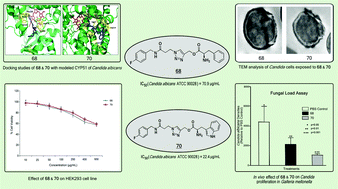Effect of novel triazole–amino acid hybrids on growth and virulence of Candida species: in vitro and in vivo studies†
Abstract
The increasing incidence of human candidiasis and the tendency of Candida species to become resistant to existing chemotherapies are well-recognized health problems. The present study demonstrates the successful synthesis of novel triazole–amino acid hybrids with potent in vitro and in vivo inhibitory activity against Candida species. Particularly, compounds 68 and 70 showed potent in vitro activity against fluconazole (FLC) resistant as well as sensitive clinical isolates of Candida albicans. Time kill curve analysis of lead inhibitors 68 and 70 showed their fungistatic nature. Secretion of hydrolytic enzymes, mainly proteinases and phospholipases, decreased considerably in the presence of 68 and 70 indicating their interference in fungal virulence. TEM analysis of Candida cells exposed to compounds 68 and 70 clearly showed morphological changes and intracellular damage as their possible mode of action. A preliminary mechanistic study carried out on the two most effective inhibitors (68 and 70) revealed the inhibition of ergosterol biosynthesis thereby causing the cells to lose their integrity and viability. The selected compounds did not show significant cytotoxicity up to a concentration of 200 μg mL−1 in the HEK293 cell line. An in silico analysis of 68 and 70 binding to a modeled C. albicans CYP51 showed critical H-bonding as well as hydrophobic interactions with the important active site residues indicating the basis of their anti-Candida role. Studies on the larvae of Galleria mellonella showed that the selected inhibitors (68 and 70) were non-toxic, did not provoke an immune response and significantly reduced Candida proliferation in vivo.


 Please wait while we load your content...
Please wait while we load your content...